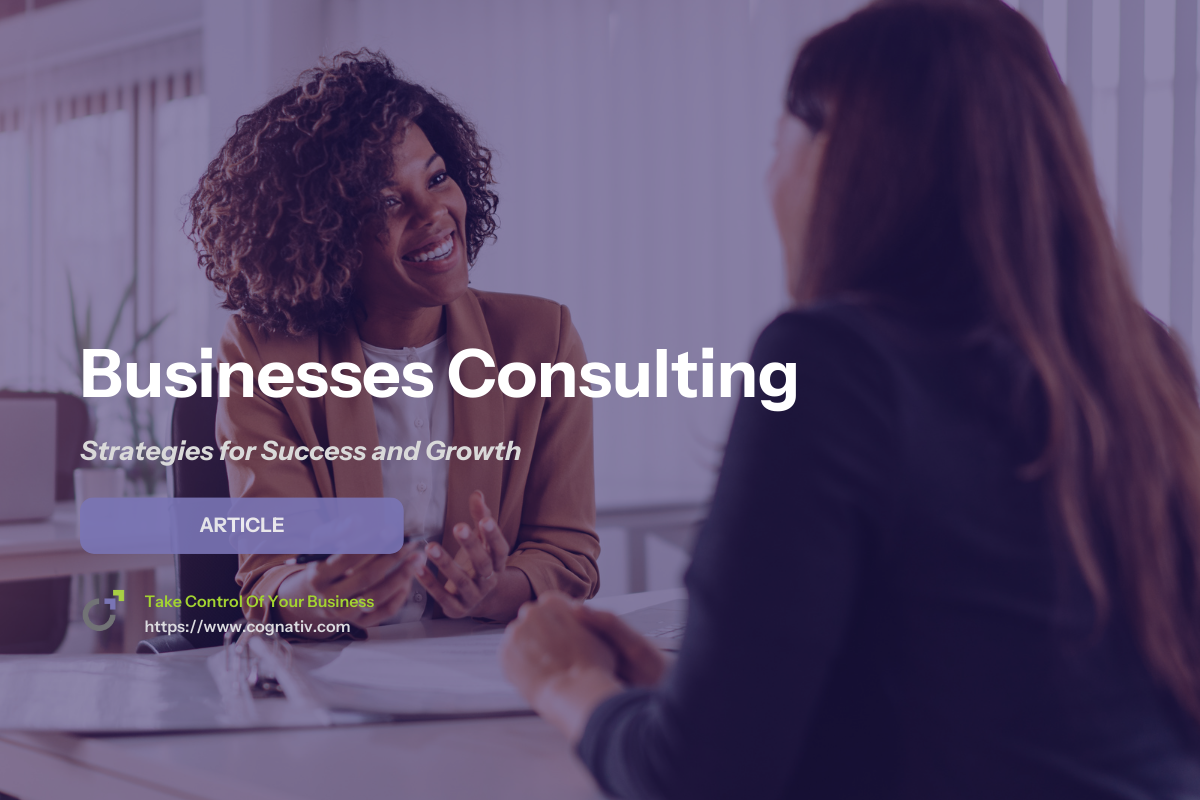Business Consulting Strategies for Success and Growth
Consulting for businesses delivers expert advice to overcome challenges and foster growth. This article covers essential consulting strategies that can transform your business operations and boost performance.
Key Takeaways
-
Business consulting focuses on enhancing performance, efficiency, and growth through expert advice tailored to specific operational challenges.
-
Consultants play a critical role in problem-solving during transitions, offering specialized knowledge and resources to foster continuous improvement and innovation.
-
Emerging trends in consulting emphasize sustainability and technology integration, allowing businesses to adapt and thrive in changing market conditions.
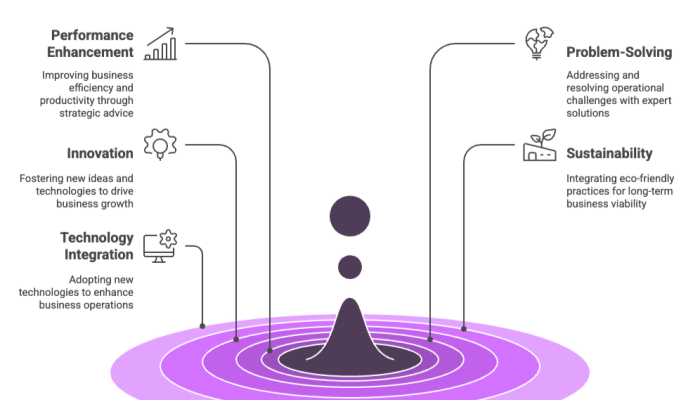

What Is Business Consulting?
Business consulting provides expert advice to companies with the goal of improving performance, efficiency, and growth. It focuses on addressing operational challenges and providing specialized guidance to business leaders. Consultants help identify challenges and opportunities for change within a business, leveraging their extensive knowledge and experience to offer unique perspectives and effective solutions.
Consulting services cater to a wide range of business needs, from strategy to execution. Consultants refine strategies and operations, enabling organizations to meet their objectives more effectively. Insights gained across various clients enable consultants to bring impactful solutions that address specific business challenges, ultimately leading to business transformation.
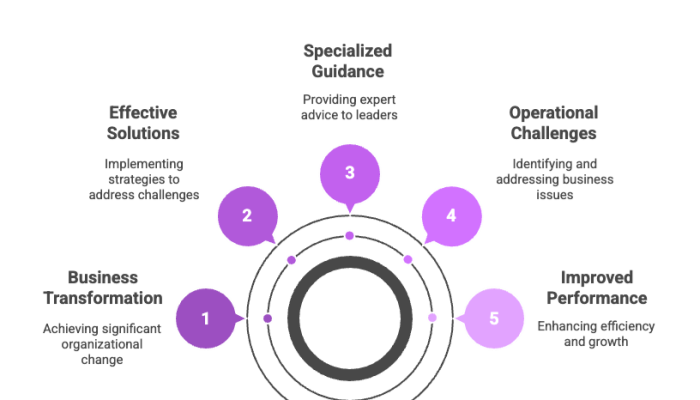

The Role of Business Consultants
Business consultants act as partners in problem-solving, working closely with organizations to identify and overcome obstacles that impede operations and efficiency. They offer a wealth of expertise, especially useful during transitional phases, helping businesses navigate significant changes seamlessly. For instance, operational consultants analyze workflows to identify bottlenecks and streamline processes.
Moreover, consultants provide training and resources to enhance the capabilities of staff and management, ensuring ongoing growth and development. Consultants collaborate with business leaders and managers to create a sustainable path for transformation, fostering continuous improvement and innovation.
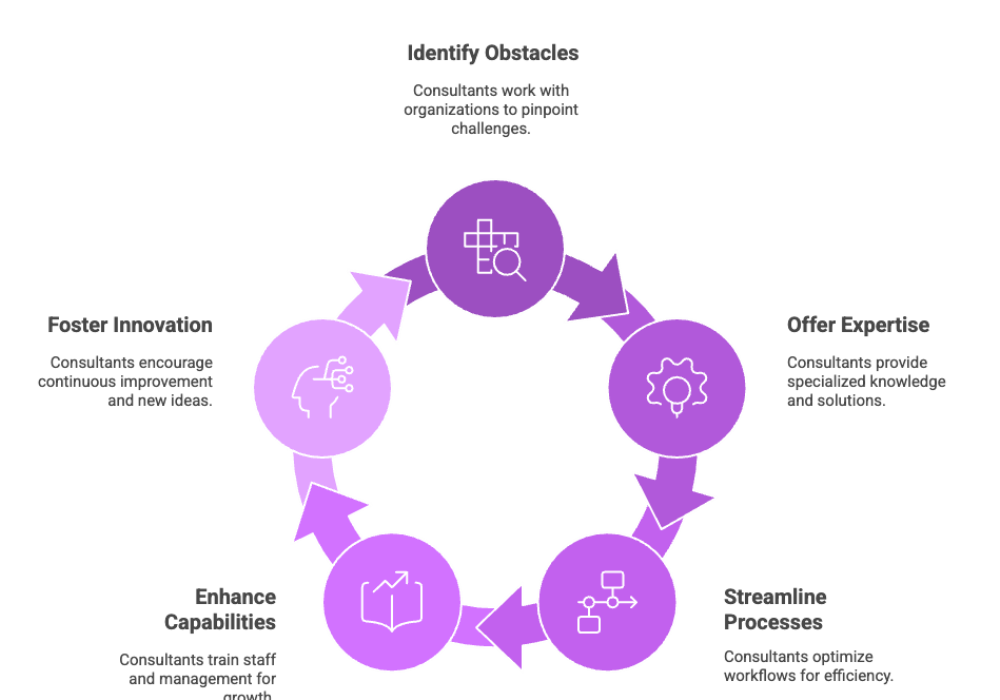

Who Needs Business Consulting Services?
Business consulting services are beneficial for a wide range of organizations, including:
-
Small businesses
-
Large corporations across various industries
-
Companies in their startup phase
-
Well-established companies
-
Non-profit organizations seeking to improve efficiency and strategic planning.
Businesses often seek consultants during transitional phases, such as mergers or policy changes, or when they are looking for new growth strategies. Leaders typically turn to consultants during periods of change or when aiming to enhance operational efficiency.
A notable example includes PwC assisting GE in successfully splitting into three companies, significantly boosting innovation and efficiency.
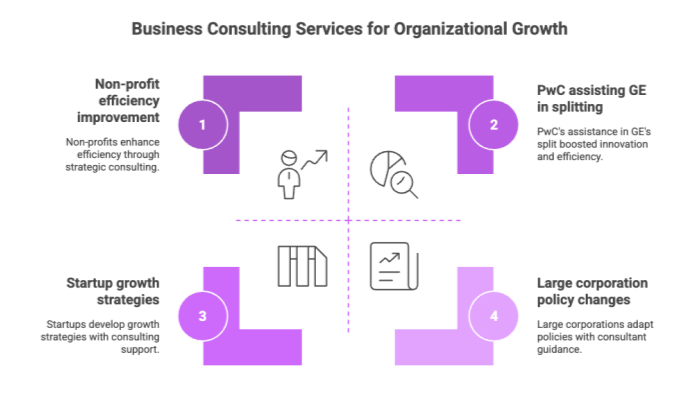

Key Benefits of Hiring Business Consultants
Hiring business consultants offers numerous advantages, particularly for small businesses that need specialized expertise not available in-house. Consultants bring a wealth of knowledge that often exceeds the capabilities of existing employees, providing targeted advice that can lead to significant improvements and benefit.
Consultants help streamline operations, manage significant projects independently, and provide low-risk, high-reward situations by offering immediate access to experienced professionals. This can lead to enhanced operational efficiency, better investment strategies through financial consulting, and the generation of creative solutions that drive growth and competitive advantage.
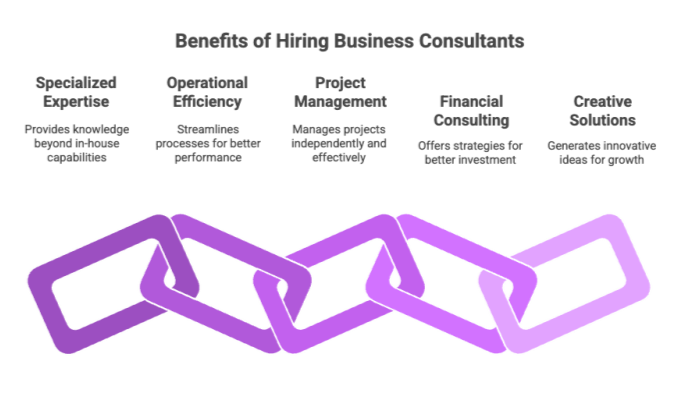

Types of Business Consulting Services
Business consulting services encompass a broad range of strategic and operational solutions tailored to meet diverse business needs. These services address specific aspects of operations or management, enhancing overall business performance. Consultants bring varied perspectives and innovative solutions that help businesses adapt and grow, making them invaluable partners in business transformation.
The main types of business consulting services include:
-
Strategic planning
-
Operational efficiency
-
Human resources optimization
-
Information technology solutions
-
Financial advisory services
Each of these areas plays a crucial role in helping businesses navigate challenges and seize career growth opportunities.
Strategic Planning
Strategic planning consultants help organizations by:
-
Clarifying their vision and mission
-
Assisting in establishing long-term goals
-
Helping align resources and set priorities to ensure effective strategy implementation
-
Developing comprehensive plans that outline the steps needed to achieve an organization’s objectives, offering a clear roadmap for future growth.
Tools like the Balanced Scorecard framework and Porter’s Five Forces model are essential in strategic planning. They help measure performance metrics and analyze competitive forces, guiding businesses in crafting growth strategies and ideas such as new product launches or market expansions.
These strategic tools are critical for understanding market dynamics and identifying growth opportunities in marketing. By using these tools, businesses can better understand their position in the market.
Operational Efficiency
Operational efficiency is the primary focus of operations consulting, particularly in business process management and program management. By streamlining processes, consultants help businesses increase productivity and reduce inefficiencies. This not only enhances overall operations but also contributes to achieving a competitive advantage.
Consultants identify potential risks and develop strategies to mitigate them, ensuring smoother operations. Their expertise allows businesses to reach their full potential by optimizing processes and improving operational efficiency.
Human Resources Optimization
Human resources optimization focuses on managing a company’s workforce to attract and retain top talent effectively. HR consultants offer a variety of services, including:
-
Talent acquisition
-
Organizational restructuring
-
Compensation
-
Benefits
-
Training
-
Workforce development
These services are critical for companies to remain competitive in the market.
Consultants assist in shaping job roles and hiring processes, enhancing the effectiveness of recruitment during team expansions or restructuring. HR consultants use their expertise and strategies to help organizations adapt to market changes and accelerate growth.
Information Technology Solutions
Information technology consulting helps businesses implement new systems, optimize infrastructure, and manage IT projects. IT consultants specialize in various areas, including:
-
Software development
-
Data analytics
-
Cybersecurity
-
Cloud computing
The demand for these services is increasing as businesses seek to adopt advanced technologies like developed generative AI.
Wyndham, for instance, implemented AI agents with PwC, significantly cutting brand review time and enhancing guest support. Similarly, Bristol Myers Squibb transformed its treasury operations through digital automation, setting new industry standards. These IT solutions significantly enhance the competitiveness of businesses in the market.
Financial Advisory Services
Financial advisory services are essential for guiding businesses towards effective financial management and profitability. Financial consultants provide services such as:
-
budgeting
-
investing
-
risk management
-
growth planning Their insights are crucial for making informed decisions about financial strategies.
Financial consultants provide expert advice, guiding businesses through complex finance landscapes and ensuring long-term stability and growth. These services are invaluable for companies looking to enhance their financial performance and achieve their objectives.
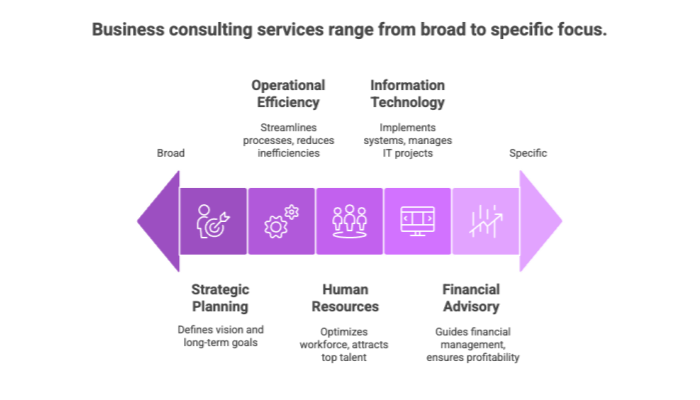

Emerging Trends in Business Consulting
Emerging trends in business consulting highlight the necessity for firms to adapt to changing market conditions through continual dialogue and effective strategic planning. Sustainability has become a key priority, with firms like Slalom integrating it into their consulting strategies to meet customer expectations. This focus on sustainability ensures that businesses can achieve growth while addressing environmental and societal challenges.
Collaboration with over 700 technology partner illustrates how consulting firms leverage digital innovations and emerging technologies to enhance their service offerings. Consulting firms that blend sustainability practices with technology innovations can innovate to drive growth and generate new opportunities for their clients.
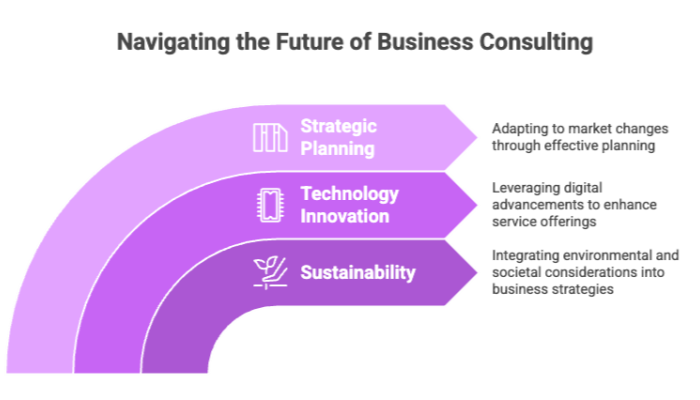

How to Choose the Right Business Consultant
Choosing the right business consultant requires careful consideration of several factors. Start by:
-
Defining the specific area where assistance is needed.
-
Assessing the consultant’s expertise to ensure it aligns with your requirements.
-
Requesting references from previous clients to evaluate the consultant’s performance in similar projects.
Conduct interviews with potential consultants to gauge comfort and communication style. Check the consultant’s track record and client list to assess their experience and reliability.
When writing a Request for Proposals (RFP), include specific project details to attract suitable consultants and establish clear contract provisions outlining deliverables and expectations for complex projects.
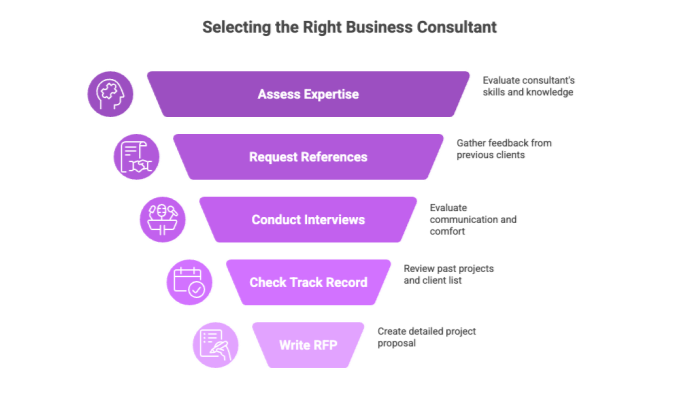

Tools and Resources for Business Consultants
Business consultants rely on various tools and resources to deliver effective services. Benchmarking allows consultants to compare their client’s metrics against industry standards, identifying performance gaps and areas for improvement. Identifying core competencies enables a business to define its unique value proposition and competitive advantages.
These tools and resources facilitate effective planning, research, and organization, enhancing the effectiveness of consultants in delivering value to their clients. These tools enable consultants to deliver actionable insights and drive business transformation.
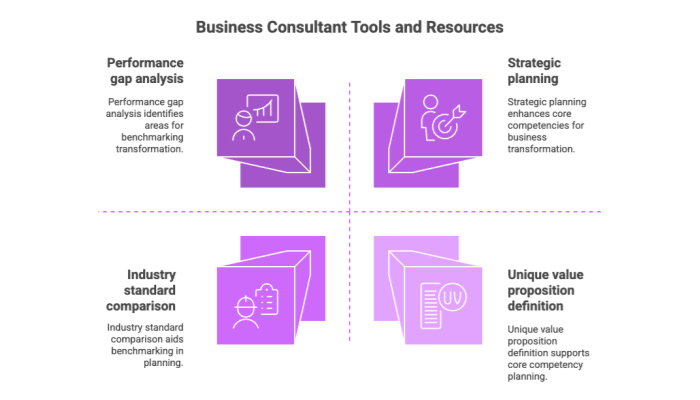

Steps to Start Your Own Consulting Business
Starting a consulting business begins with:
-
Assessing market demand and competitors.
-
Conducting early market research to gain insights into the target audience and refine the business approach.
-
Crafting a well-crafted business plan that guides strategic decisions, attracts partners, secures financing, and supports the early business lifecycle.
The business plan should be clear, concise, reflect a deep understanding of the market, and be adaptable to changing conditions. This adaptability is crucial as it provides guidance for pivoting and ensuring long-term success in the consulting industry.
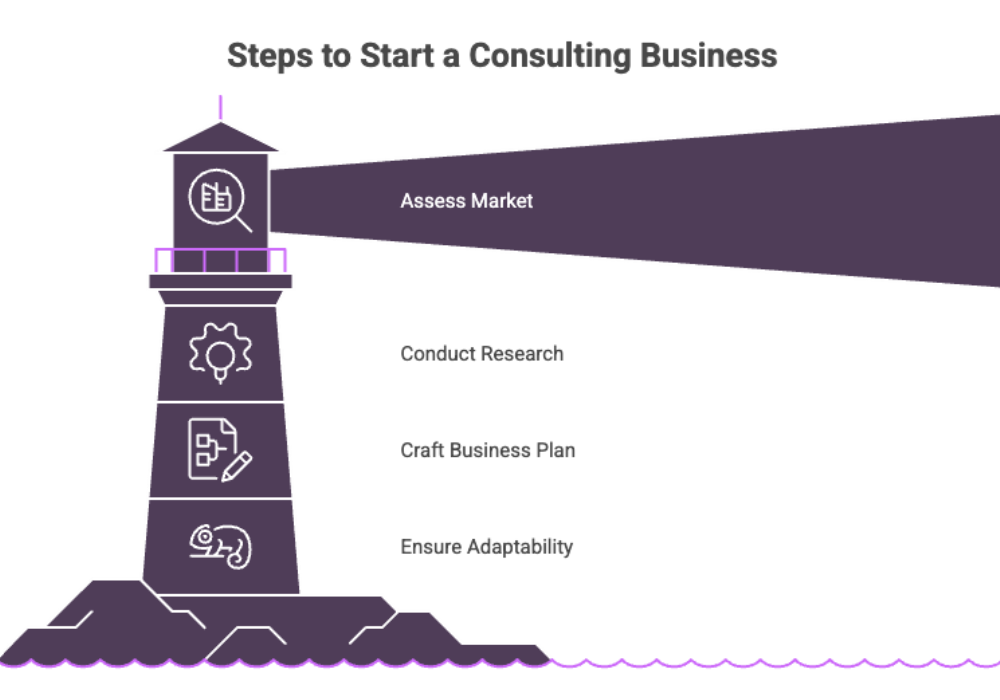

Real-World Success Stories
Real-world success stories highlight the tangible benefits of business consulting. For example, Maryann Byrdak’s experience with Slalom was characterized by healthy conversations and banter, leading to improved performance and culture within the business. The success of the consulting relationship was underpinned by open communication and a collaborative environment.
As a result of the engagement, the business experienced increased efficiency and employee satisfaction. These stories demonstrate how effective consulting can transform businesses and help them achieve their goals, and how great results can happen.
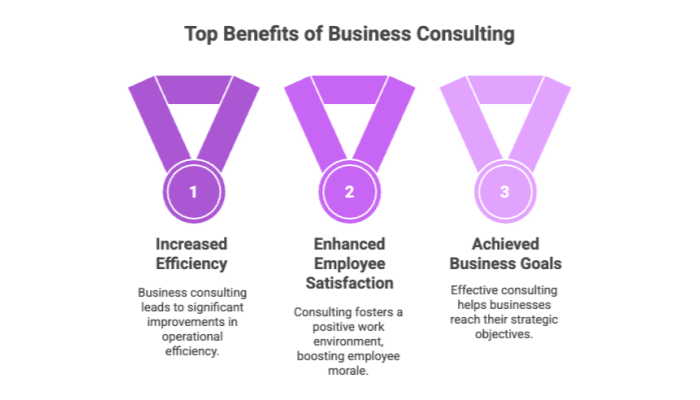

Summary
Business consulting offers a wealth of opportunities for growth and efficiency across various industries. By understanding the role of consultants, the benefits they bring, and the types of services available, businesses can make informed decisions to leverage these services effectively. Emerging trends and real-world success stories further underscore the value of consulting in today’s dynamic market.
In conclusion, whether you are a business leader seeking to drive growth or an aspiring consultant looking to start your own business, the insights provided in this guide aim to inspire and equip you with the knowledge needed to succeed. Embrace the power of business consulting to transform your organization and achieve your long-term objectives.

Frequently Asked Questions
This FAQ section addresses common questions about consulting for businesses, providing clear insights into key matters such as selecting the right consultants, understanding the role of media in marketing strategies, and the importance of equipment and technology in delivering effective business consulting services across various locations.
Whether you are interested in exploring growth opportunities or navigating complex projects, these answers will help you gain a deeper understanding of how business consulting can benefit your organization.
What is the primary purpose of business consulting?
The primary purpose of business consulting is to enhance performance and efficiency while driving growth by tackling operational challenges and offering expert advice to business leaders.
Who can benefit from business consulting services?
Any business, whether a small startup, a large corporation, or a non-profit organization, can benefit from business consulting services, especially during times of transition or when exploring new growth strategies.
What are the key benefits of hiring business consultants?
Hiring business consultants provides access to specialized expertise that enhances operational efficiency and fosters innovative solutions, ultimately driving growth and competitive advantage. These benefits ensure more effective project management and strategic development.
How do I choose the right business consultant?
To choose the right business consultant, clearly define your needs and assess their expertise by requesting references and conducting interviews. Establish a contract that outlines deliverables and expectations to ensure alignment.
What are some emerging trends in business consulting?
Emerging trends in business consulting highlight the importance of sustainability, the integration of digital innovations, and partnerships with technology providers to improve service offerings and foster growth. Adapting to these trends is crucial for staying competitive in a rapidly evolving market.

